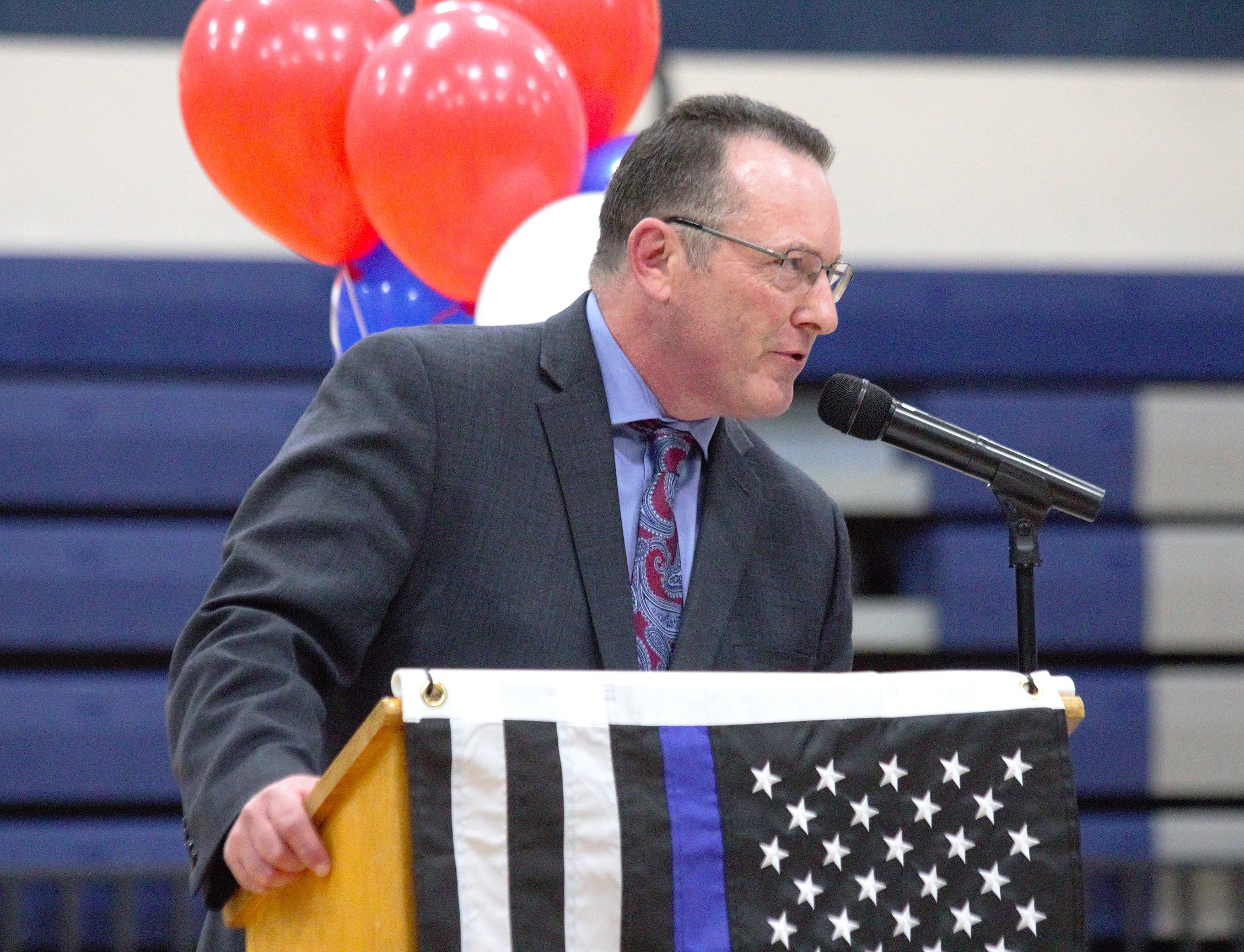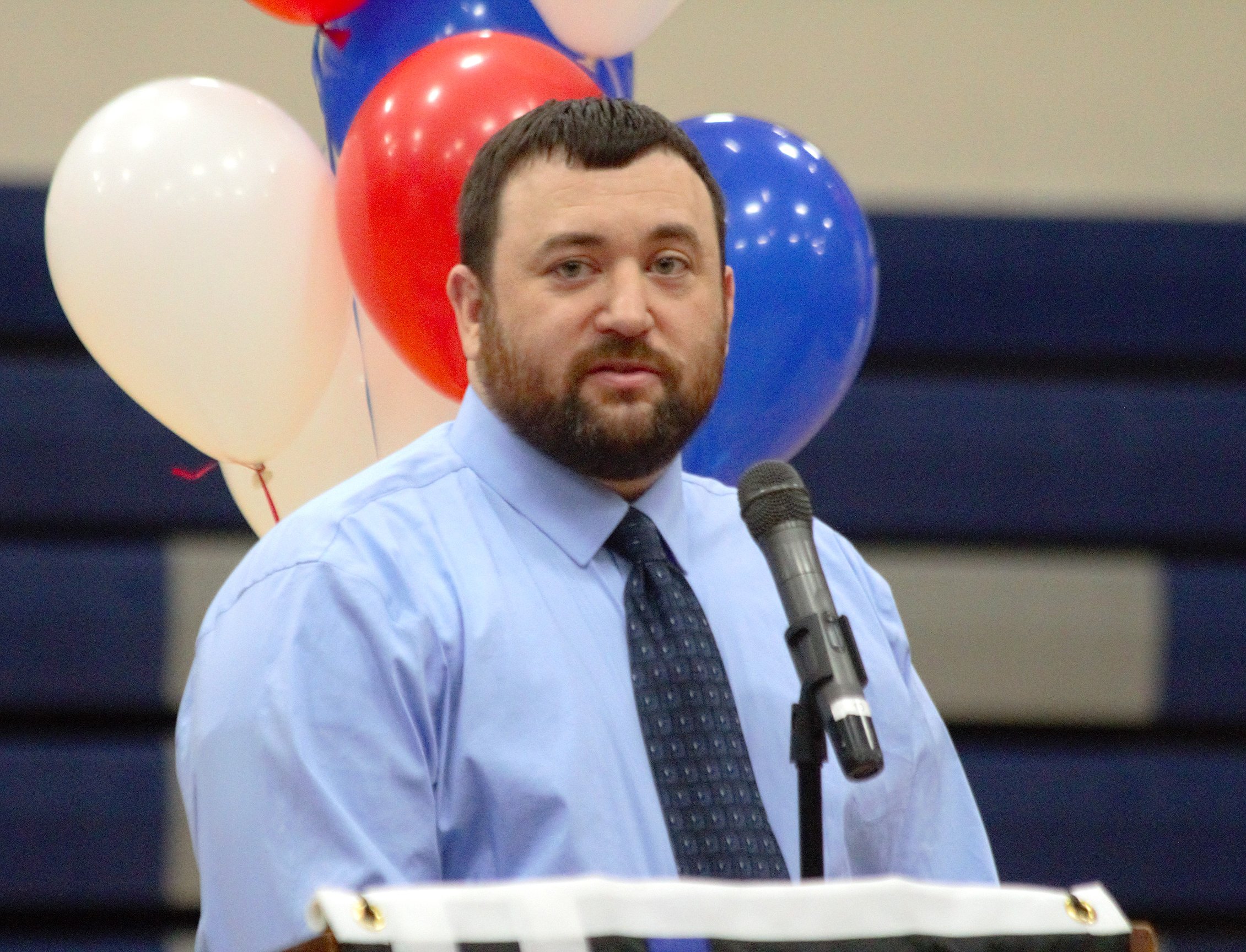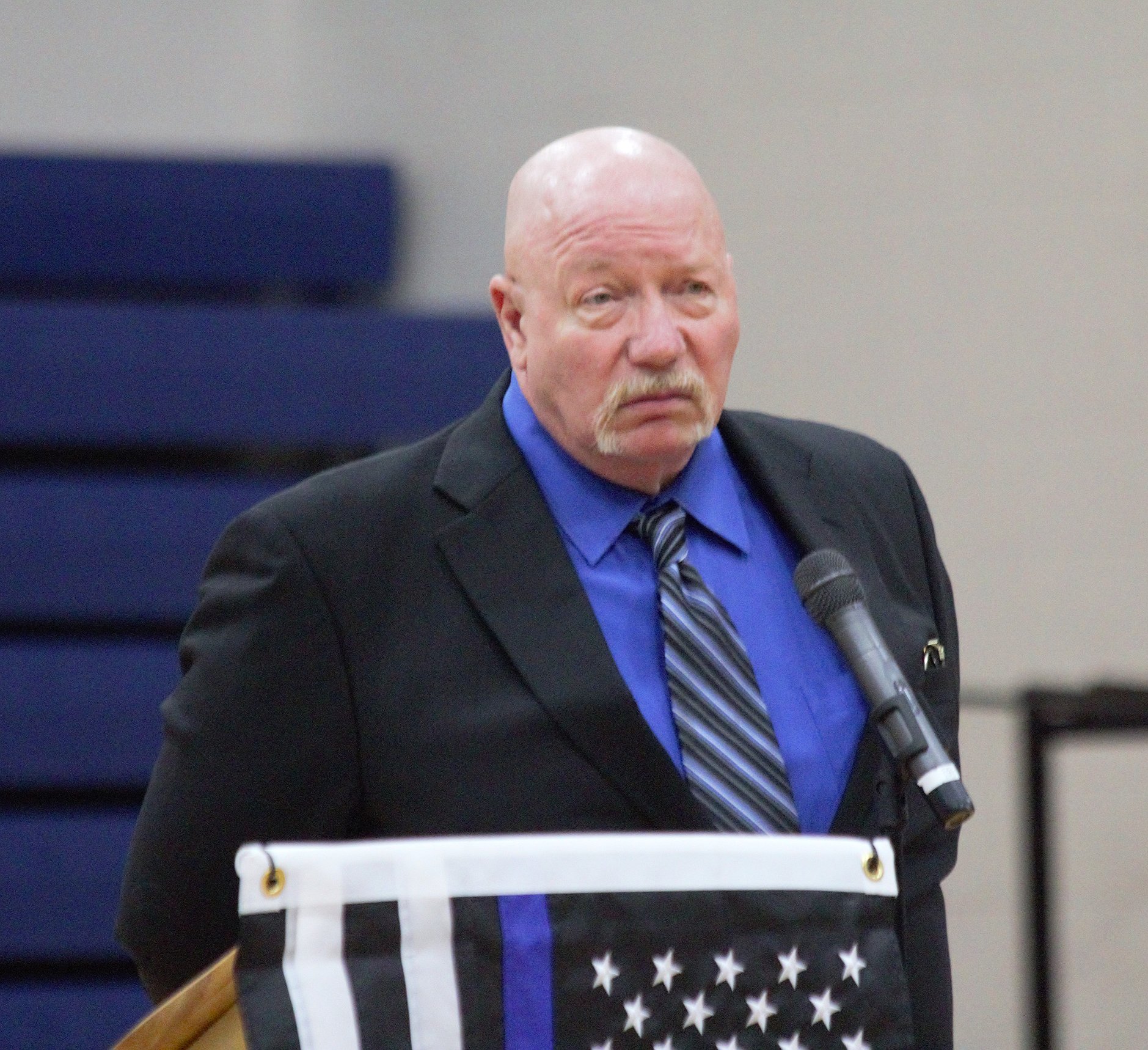Sheriff candidate debate, more of Q&A
BONNERS FERRY — Boundary County’s three sheriff candidates gave their pitch to voters on March 21 to a packed Bonners Ferry High School gymnasium.
Organized by the Panhandle Republican Women, the debate resembled more of a question-and-answer session than a true debate, as candidates did not have back-and-forth discourse, nor address other candidates in their answers. It is estimated that between 400 to 500 people were in attendance.
Jon VanGesen works at the Bonner County Sheriff's Office as lieutenant of professional standards and oversees the operations of 911. He has worked in law enforcement in Washington state from 1991 to 2020, holding nearly every rank in law enforcement. He’s been in law enforcement for nearly 35 years.
Travis Stolley is a reserve officer at Boundary County Sheriff's Office, and has previously been a detective at BCSO and at Bonners Ferry Police Department, reaching the rank of corporal and serving as a patrol officer and school resource officer. He started his law enforcement career in 2014 and spent nine years in the U.S. Marines.
Dave Schuman is a Boundary County Sheriff’s deputy, a position he has held since 1999. He has also served for 20 years in the U.S. Army Military Police.
Schuman confirmed with the Herald he is on administrative leave pending an Idaho Police Investigation regarding police standards. Sheriff Dave Kramer did not comment on the matter.
Many of the debate questions centered around experience in administrative positions, applying for grants, managing budgets and saving the department money.
Schuman said he had only applied for one grant when in the military.
Throughout many of his roles, VanGesen said he has applied for grants and additional funding when at Kitsap County Sheriff by way of assisting in investigations and drug seizures. He continually highlighted his experience of collaborating with other agencies and task forces throughout his answers.
The candidates shared many of the same answers in regards to defending the Second Amendment. When asked if there was ever a circumstance where they would go door to door to collect firearms, all said “no.”
Stolley said that would be unconstitutional and would not happen with him as Sheriff. VanGesen agreed that it would violate state law and would be a criminal act.
“It’s a no-brainer, no,” Schuman said.
The candidates also came to the same conclusion when asked what they would do if a busload of illegal aliens were to come to Boundary County.
VanGesen said he would rent buses to send them back out, but would first check with the county prosecutor to see about liability issues.
Schuman said he would contact the Border Patrol and would bus out the illegal aliens, but would follow the legal process.
Stolley said Border Patrol is frustrated that they can’t do their job, however, the issue is a national issue not just a Boundary County issue.
When asked if either of the candidates would follow federal mandates or executive orders that violate their oath, all said they would not violate the Constitution.
“The role of sheriff is to serve the will of the people,” Stolley said.
VanGesen said he would not enforce unlawful mandates, as Bonner County Sheriff Daryl Wheeler, his current boss, hadn’t enforced unconstitutional mask mandates.
“That is leadership modeled to me. My number one pledge was to defend the U.S. Constitution and that of Idaho,” he said.
He added there are good laws in place in Idaho that prevent gun seizures from the federal level.
“I’ve been called the constitutional candidate, [that’s] baloney,” Schuman said. “There’s three guys here who gave oaths to the constitution [....] and that’s what I’ll do.”
Candidates were asked what their experience has been responding to crimes against children, what they believe the role of police officers is in regards to Idaho’sChild Protective Acts, and how they plan to work cooperatively with Idaho Health and Welfare and County Prosecutor.
Stolley spoke of the time he served as a school resource officer with Bonners Ferry Police Department and the need for deputies to have the understanding and training to work with children victims and foster relationships with Health and Wellfare, so issues will not slip through the cracks.
“I can’t think of anything worth fighting for more than our kids,” he said.
“Unfortunately the gentlemen here have seen way too much harm to children like I have, and it’s some of the worst cases we deal with,” VanGesen said. “It comes down to the relationships with social workers and the Prosecutor's Officer to ensure we are handling things properly, and we are teaching our deputies properly.”
He spoke on his experience as a foster parent, and having to remove children from meth labs.
From a recent ruling, courts are interpreting that law enforcement needs a court order before removing children from the home, before standard was an imminent threat to a child in the home, he said. It will be the responsibility of the sheriff to build relationships with the court and prosecutor guidance on what that ruling means in order to give deputies what they need to protect children in circumstances they need to be protected.
Schuman said his daily inspiration is his 4-year-old granddaughter and in the past has housed children in his own home. He believes BCSO needs a team working with child cases that coordinates with other agencies to ensure children don’t fall through the cracks.
When it comes to keeping drugs out of the community, VanGesen spoke on his experience on task forces, investigations and teaching drug training.
“I’ve been recognized as an expert in Federal and state courts on drug investigations. I figure out ways to get our drug dealers prosecuted,” VanGesen said. He highlighted a new law, that come July drug dealers can be charged when a client overdoses.
Schuman said the drug problem in the county is so bad that deputies could work 24/7/365 and still there would be an issue. He said a solution is to recruit community members to provide intel for a task force.
“Fentanyl is a huge issue across the nation and Idaho,” Stolley said. “Proactive police work goes a long way.”
Boundary County is home of Ruby Ridge, where the U.S Marshall and FBI engaged in an 11-day stand-off with Randy Weaver and his family after he did not appear in federal court on a bench warrant for firearm charges. Three people died, including Weaver’s 14-year-old son.
Candidates were asked what each would have done in the situation and what would be their response to an even more “feral” federal government.
“We have all learned from American tragedies, Ruby Ridge, Waco, of the faults of allowing the federal government to come in and control our county citizens, ” VanGesen said. “Sarah Weaver has said that if “the sheriff had come talk to my dad, this all would be over.”
He said he would be the person making contact with county residents and not the feds, adding relationships don’t begin at the time of the incident and it is his job as sheriff to establish relationships with residents and other law enforcement entities.
Schuman called Ruby Ridge a tragedy and a lesson on what not to do.
“There is no reason the federal government should be coming in and storm trooping up the hill,” he said. He focused on making contacts and that he will tell every entity they need to let him know they are coming.
Stolley said BCSO could have handled the situation and not relinquished control. Being connected to the community and answering constituents is key, he added.
“I was very young when that happened,” Stolley said. “The sheriff needs to be able to step up to the plate when needed and say ‘we’re not going to allow this to happen.’”
Candidates were asked individual questions as well.
After 25 years and three different sheriffs, Schuman is still at the rank of corporal. When asked ‘why haven’t you been promoted,’ he said the structure of the department is the issue. Above corporal is sergeant, then undersheriff and sheriff.
He gave more information on utilizing citizens in his role of sheriff, as he has proposed a citizen’s academy. He said it depends on their capacity and skills.
In response to how he can be an effective sheriff with only eight years of experience, Stolley highlighted his experience in the Marine Corps and being deployed overseas and leadership experience will transfer over to being sheriff.
He added that he walked away from law enforcement because he needed to bring attention to his family business, but that law enforcement is a calling and he is called. He said being born and raised in Boundary County doesn’t make him a better candidate, but he shares the community’s value of service.
When asked if he would bring “big city policies to Boundary County,” VanGesen told those present that Kitsap County and Port Orchard, where he has formerly served, have a population of 15,000.
He compared law enforcement experience to being a doctor. “If you have an emergency doctor who has worked in Salt Lake City comes to work in Boundary Community Hospital [...] do you think it will be a better emergency department because of the skills and experience that he brings?”
He added he’s worked with many agencies in Idaho and Washington and been successful in those relationships.
“The biggest challenge here is building trust in the community. I’ve built trust in every community I’ve served,” he said, adding he’s done it by coaching youth sports, being involved in foster care and that his family and adult children live in the area.
He elaborated on a Kitsap County lawsuit that was settled out of court for $200,000 that alleged he racially profiled an African American man at a traffic stop.
In 2015, VanGesen was a patrol sergeant.
“For two years, 11 months, and two weeks there were no complaints. The man was arrested for obstructing and cited for various traffic violations,” he said. “And as you know, the Puget Sound region went berserk with Black Lives Matter, Aniifa and Defund the Police. Thus a federal lawsuit was filed.”
The prosecutor's office determined it would have to prove VanGesen had violated no policy or no laws to defend him. In 2021, the case was settled after VanGesen had retired from Kitsap County Sheriff's Office.
“The insurance poll for the state of Washington, the Democratic board of commissioners, the Democratic elected prosecutor said it was a business decision to settle it with the subject,” he said. “As sheriff, I will back our employees 110% if they did not violate law and policy and I expect the prosecutor's office and our community to stand behind them as well.”
After the debate, candidates were asked what they would do if they did not receive the GOP bid.
Stolley said he would remain a member of the BCSO reserves and Search and Dive Rescue.
VanGesen said unlike another candidate he won’t be retiring and opening a coffee shop, rather he will continue to work for Bonner County Sheriff Wheeler until he is “no longer needed.”
Schuman said if he doesn’t receive the bid, he would continue to always strive to do the right thing, even if it is not popular, something he has done since August 1999. He added that he did not remember much of the debate, as he was on “autopilot” and recovering from the flu.
Bonners Ferry Police Chief Willie Cowell was at the debate and said if he knew nothing about the race and candidates before the event, he would have been impressed with VanGesen. Cowell has not endorsed any candidate, as no candidate has asked for an endorsement.
“I will be voting for Travis Stolley,” he said, whom he has worked with at BFPD.
The Primary election is May 21, and as all candidates for sheriff are running on the Republican ticket, there will be no general election unless a write-in campaign is formed.







